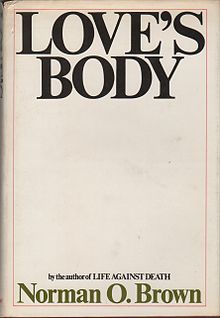Love's Body

Cover of the first edition
|
|
| Author | Norman O. Brown |
|---|---|
| Country | United States |
| Language | English |
| Subject | Philosophy |
| Publisher | Random House |
|
Publication date
|
1966 |
| Media type | Print (Hardcover and Paperback) |
| Pages | 276 |
| ISBN | |
Love's Body is a 1966 book by the American classicist Norman O. Brown.
Literary critic Camille Paglia calls Love's Body "one of the most famous and influential books of my college years."Sam Keen notes that Love's Body is very different in approach from Brown's previous book, Life Against Death (1959): "The old style is no more. Gone are the rational arguments supporting the end of argumentation, the prose defending poetry, the reasoned appeals for ecstasy. In their place are aphorism, poetry, and free association. Playfully and with abundant exaggeration Brown paints a portrait of the divinely inspired schizophrenic who transforms the world by poetic imagination and by his refusal to accept the boundaries that define the normal (or average) sense of reality." Brown commented of the book that, "I did feel when writing Love's Body some kind of obligation to undo what I had done in Life Against Death. I wanted to release any followers I had acquired or at least to confuse them. [...] I felt under some existential stress to write Love's Body in order to torpedo Life Against Death, to destroy it as a position."
Paul Robinson writes that Love's Body "makes quite clear that psychoanalysis was only a stage in Brown's development toward a rather curious (and radical) brand of religious mysticism. The very concrete body of Freudian psychology has been absorbed into the Mystical Body of traditional Christian theology. To be sure, Freud remains an important authority, and there is a racy (and confusing) display of sexual rhetoric. But the erotic language is largely metaphorical; as Brown himself says, 'Everything is symbolic...including the sexual act.' Most significant, Brown has been candid enough to make explicit the pronounced antipolitical assumptions which were only implicit in Life Against Death. He now argues that politics can never be the vehicle of liberation, not merely because political action is invariably corrupt, but also because politics don't really exist. Political revolutions are 'reorganizations of the theater, of the stage for human action. The matter remains the same.'"
Love's Body was criticized by Herbert Marcuse in the February 1967 issue of Commentary. Brown's reply to Marcuse appeared in Commentary's March 1967 issue.
...
Wikipedia
